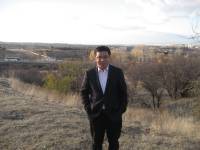Liu Yi
Liu Yi is Professor of history and international relations at Liberal Arts College of Shanghai University. He received his BA and MA in history respectively from Shanxi Normal University and Shanghai University, and a PhD in religious studies from The Chinese University of Hong Kong (2008). In the 2010-11 academic year, he was a post-doctoral fellow at Berkley Center for Religion, Peace and World Affairs, Georgetown University. And from 2013 to 2016, he acted as the Chinese Director of Confucius Institute at Boğaziçi University, Turkey. Trained in history of religion and comparative religions, Liu is good at inter-disciplinary studies as well as cross-cultural observations. In addition to history, he is also good at theories of sociology and political science. And his research mostly covers two religions, Christianity and Islam, with comparative perspective from Confucianism as his native culture. He is author of four monographs, as well as co-editor of six volumes and translator of two books. Liu also publishes broadly in both Chinese and English academic journals.
Religion and Development in Global and Comparative Contexts
Thereafter, Liu turned to the field in China. His first concern is religious philanthropy as understood in development terms. He organized an international symposium on “Religious Philanthropy and Public Welfare in China,” which was later published as an edited book with the same title. After then, he went in depth to observe Pentecostalism in socio-economic development of China. He spent three years in field work together with his team, and finished a monograph entitled: Global Pentecostalism and Local Christianity: A Life History Survey (2018).
Trained in the academic tradition of comparative religions, Liu had a chance to live and work in Turkey for three years. During that period, he focused on Islam and political economy in Turkey. He co-edited the publication series of Annual Development Report of Turkey (2014-2016), and finished his own monograph, Istanbul in History: The City, Empires & Civilizations (2022).
Now, under the project of “Religion and Development in Global and Comparative Contexts,” Liu has a broader vision and a specific focus. Broadly speaking, he would like to review how different religions are engaged with development in a global context. For this, he wrote one chapter for The Routledge Handbook on the History of Development (2022). He is also in charge of a project about world Christianity with the sponsorship of China’s National Foundation of Social Sciences.
Specifically, Liu is working on a program on faith-based organizations and post-pandemic development. Though the COVID-19 pandemic is over, there are a lot of post-pandemic concerns, such as religion and mental health, religious freedom and minority rights, religion and social order. For him, the COVID-19 pandemic is not just a public health issue, it also reflects deep crisis in current times. After the pandemic, religion has an important role in social and spiritual reconstruction. And more importantly, the pandemic has a strong religio-political meaning in global context.
Liu is also supervising Ph.D and MA students working on relevant topics. For example,
Hasan Aydin, Ph. D Candidate, “Asia-Africa Development Cooperation: Development Summits Initiated by Japan, China and India”
Cai Huashang, MA student, “OECD and Its Contribution to the Ideas of Development”
Lin Yuchen, MA student, “International Labor Organization and Minority Rights during COVID-19 Pandemic”
Zhou Yue, MA student, “Islam Economics and Islamic Finance: Case Study of Islamic Development Bank”

